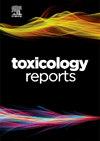Interaction of cannabis cultural use and health: A case of acute myocardial infarction following consumption of cannabis beverage (Bhang)
Q1 Environmental Science
引用次数: 0
Abstract
Cannabis is a psychoactive substance consumed worldwide in the form of smoking, vapors, food additives, or beverages. Delta 9 tetrahydrocannabinol (THC) is a primary component responsible for short and long-term effects on various cognitive and motor functions in a dose-dependent manner. The legal status of cannabis has shifted significantly in recent decades. Some regions maintain strict penalties, but others have legalized them for medicinal use. In India, the use of cannabis in any form is illegal; however, the use of bhang, a cannabis beverage made from leaves, is acceptable due to cultural reasons and thus permitted in some places. We report the case of a 28-year-old male who developed massive anterior wall myocardial infarction after consuming bhang during the Holi festival. He presented with sudden retrosternal chest pain, which was initially ignored till it intensified enough, prompting him to seek emergency medical help approximately 24 hours after symptom onset. Cannabis intoxication impaired attention and information processing, leading to delayed presentation. The patient was managed successfully by timely cardiac intervention. The evolving landscape of cannabis regulations necessitates heightened awareness among health authorities about potential cardiovascular risks associated with its consumption, particularly in forms like Bhang, where concentrations are unregulated and variable.
大麻文化使用与健康的相互作用:饮用大麻饮料(Bhang)后发生急性心肌梗死的病例
大麻是一种精神活性物质,全世界都以吸食、蒸气、食品添加剂或饮料的形式消费大麻。δ9四氢大麻酚(THC)是一种主要成分,能以剂量依赖的方式对各种认知和运动功能产生短期和长期影响。近几十年来,大麻的法律地位发生了重大变化。一些地区保持严格的惩罚措施,但另一些地区则将大麻合法化用于医疗用途。在印度,使用任何形式的大麻都是非法的;然而,由于文化原因,使用大麻叶制成的大麻饮料(bhang)是可以接受的,因此在一些地方是允许的。我们报告了一例 28 岁男性患者的病例,他在 Holi 节期间饮用大麻饮料后发生了大面积前壁心肌梗死。他突然出现胸骨后胸痛,起初被忽视,直到疼痛加剧,促使他在症状出现约 24 小时后寻求紧急医疗救助。大麻中毒损害了患者的注意力和信息处理能力,导致患者延迟发病。通过及时的心脏介入治疗,患者得到了成功的控制。随着大麻法规的不断发展,卫生部门有必要提高对消费大麻可能带来的心血管风险的认识,特别是像 Bhang 这样的大麻,其浓度不受管制且变化不定。
本文章由计算机程序翻译,如有差异,请以英文原文为准。
求助全文
约1分钟内获得全文
求助全文
来源期刊

Toxicology Reports
Environmental Science-Health, Toxicology and Mutagenesis
CiteScore
7.60
自引率
0.00%
发文量
228
审稿时长
11 weeks
 求助内容:
求助内容: 应助结果提醒方式:
应助结果提醒方式:


